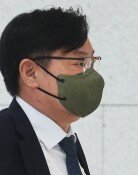Cheong Wa Dae’s proposal of phased constitutional revision
Cheong Wa Dae’s proposal of phased constitutional revision
Posted April. 09, 2018 08:00,
Updated April. 09, 2018 08:00
The South Korean presidential office Cheong Wa Dae is reportedly considering a phased revision of the constitution that may put its own bill to a national vote alongside the local elections slated for June 13 and push back additional amendments to 2020. An official with Cheong Wa Dae neither confirmed nor denied the report on Sunday, saying that President Moon Jae-in, when proposing the bill on March 26, commented that if the parties find it difficult to reach an agreement on the revision bill, conflicting issues can be left behind this time and dealt with later, which implies that a phased constitutional amendment is being contemplated as an option.
Calling for a “phased revision” of the constitution, Cheong Wa Dae and the ruling party claim that the momentum for constitutional revision will be lost if a national vote fails to be held in tandem with the June 13 elections, as pledged by all presidential candidates last year. Currently, a power structure is the key issue where the ruling and opposition parties are split over. Cheong Wa Dae has proposed to change a single five-year presidential term to allow one consecutive reelection for a four-year term while the main opposition Liberty Korea Party (LKP) has been insisting on a power-sharing model under which the president takes control of external affairs and the prime minister, picked by the parliament, leads internal affairs. Still, there seem to be clauses that both parties may be able to reach a broad agreement such as the inclusion of a system for the public to summon lawmakers, the removal of the prosecution’s authority to request a warrant, strengthening regional autonomy, and increasing the proportionality of elections.
Yet, revising the constitution only partly through the June elections as pursued by Cheong Wa Dae does not guarantee that the momentum for constitutional amendment will not be lost. In the worst-case scenario, with some parts of the constitution revised at least in formality, an additional amendment of a power structure may not be brought up any longer. Calls for constitutional amendment were raised in the first place mostly because of a need for the dispersion of a president’s imperialistic power. While Cheong Wa Dae has demanded that the LKP keep its campaign pledge, pushing for a bill that clearly falls short of limiting the emperor-like powers of president is also far from fulfilling the promise. Even if the constitution will be revised in stages, it should at least include a change in the current power structure to be truly meaningful.
Now is the time for the National Assembly, not Cheong Wa Dae, to step forward and it is especially so for the ruling Democratic Party of Korea (DPK). The public does not oppose the presidential office’s proposal of an amendment bill itself, but thinks that the bill should have included more measures to share powers. Therefore, the ruling party should propose a newly adjusted bill that reflects the will of the people and ask for the public’s opinions while negotiating with the LKP. To respect the spirit of the constitution, the parliament should take the lead in discussion on the constitutional amendment. Till when will the DPK continue to repeat what Cheong Wa Dae says like a parrot?
Headline News
- Med professors announce intention to leave hospitals starting Thursday
- Bridge honoring Sgt. Moon Jae-sik unveiled in Pennsylvania
- Chief of Staff Chung tells presidential secretaries to stay away from politics
- US FTC bans noncompete agreements
- N. Korea launches cyberattacks on S. Korea's defense companies







